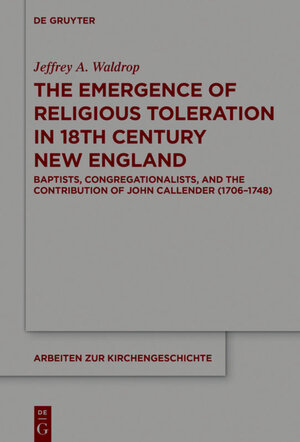
The Emergence of Religious Toleration in Eighteenth-Century New England
Baptists, Congregationalists, and the Contribution of John Callender (1706-1748)
von Jeffrey A. WaldropThis book examines the life and work of the Reverend John Callender (1706-1748) within the context of the emergence of religious toleration in New England in the later seventeenth and early eighteenth centuries, a relatively recent endeavor in light of the well-worn theme of persecution in colonial American religious history.
New England Puritanism was the culmination of different shades of transatlantic puritan piety, and it was the Puritan’s pious adherence to the Covenant model that compelled them to punish dissenters such as Quakers and Baptists. Eventually, a number of factors contributed to the decline of persecution, and the subsequent emergence of toleration. For the Baptists, toleration was first realized in 1718, when Elisha Callender was ordained pastor of the First Baptist Church of Boston by Congregationalist Cotton Mather.
John Callender, Elisha Callender’s nephew, benefited from Puritan and Baptist influences, and his life and work serves as one example of the nascent religious understanding between Baptists and Congregationalists during this specific period. Callender’s efforts are demonstrated through his pastoral ministry in Rhode Island and other parts of New England, through his relationships with notable Congregationalists, and through his writings. Callender’s publications contributed to the history of the colony of Rhode Island, and provided source material for the work of notable Baptist historian, Isaac Backus, in his own struggle for religious liberty a generation later.




